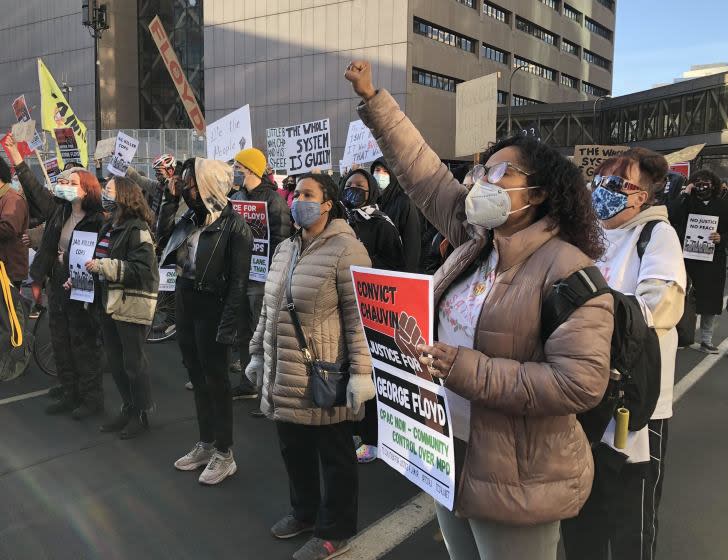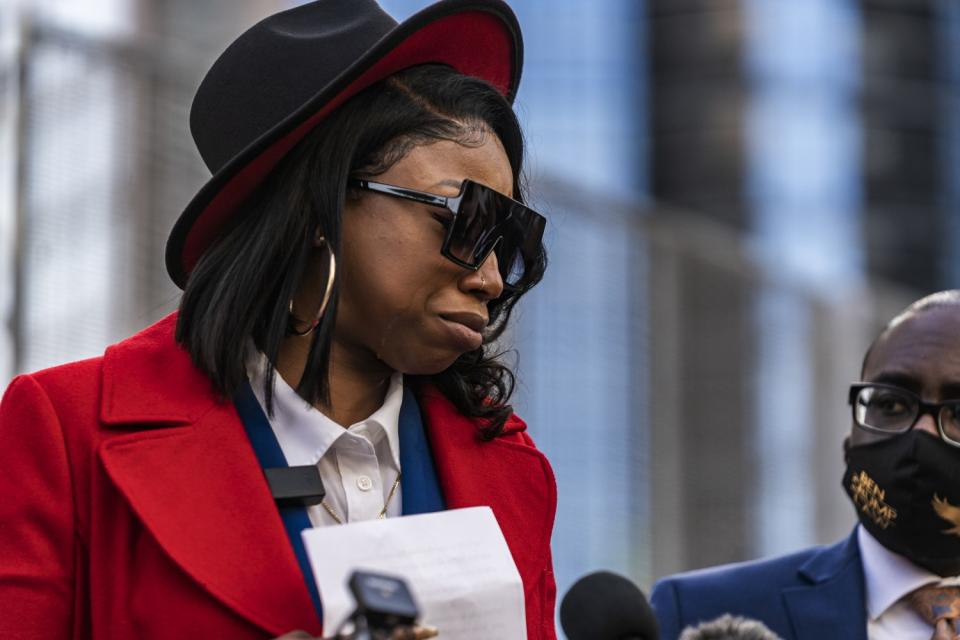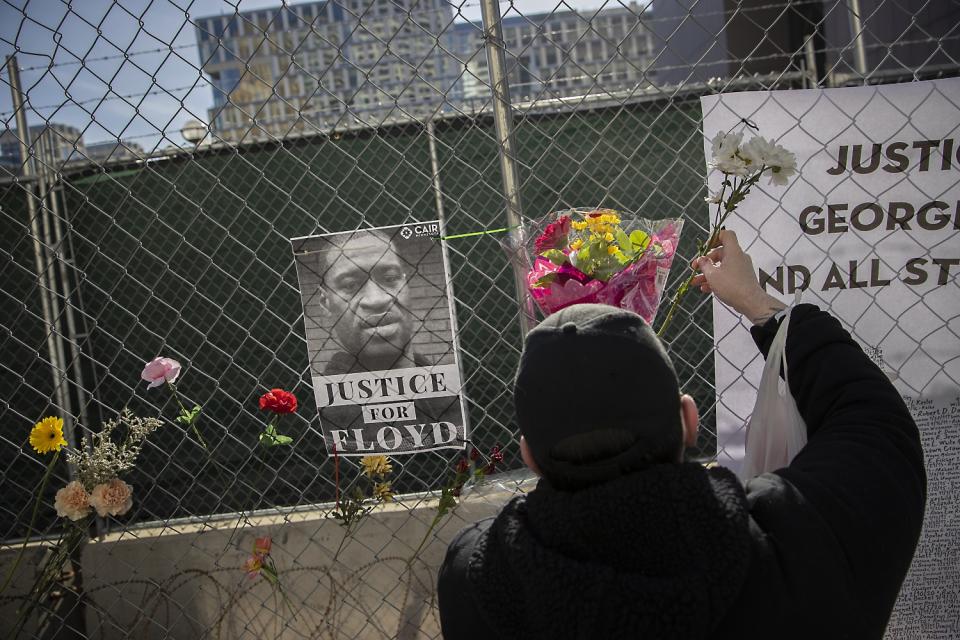Jury selection begins for Derek Chauvin, former police officer who killed George Floyd

- Oops!Something went wrong.Please try again later.
As hundreds of protesters chanted outside the heavily fortified downtown courthouse here Monday, jury selection began in the trial for the first police officer charged in the killing of George Floyd.
Accused of second-degree murder and manslaughter, former Minneapolis Police Officer Derek Chauvin appeared in a navy blue suit and tie and a black mask, occasionally taking notes. Clear plastic dividers ran down the middle of the defense and prosecution tables and separated the judge from the rest of the courtroom. The seat allotted for Chauvin's family was unoccupied.

The scene outside the courthouse was tense as sheriff's deputies stood among concrete barriers and fences topped with razor wire. Hundreds of demonstrators marched nearby in a city that last year became the epicenter of protests against racial injustice. Some on Monday carried a banner that said, "The world is watching." Many waved signs that said “Convict Chauvin,” “Prosecute killer police” and “The whole system is guilty.”
Those inside the 18th-floor courtroom — where the proceedings were livestreamed online — couldn't hear protests on the streets below. The judge limited attendance to 30 people due to the pandemic, including one member of Floyd’s family, sister Bridgett Floyd, 30, who had traveled from North Carolina and appeared in court wearing a red blazer and matching broad-brimmed hat.
"My family and I are glad the wait is finally over and the day is finally here," she said outside the courthouse afterward. "We are praying for justice, and our hope is that justice prevails."
She recalled looking at Chauvin in court and thinking of her brother, whom she called Floyd, and his 7-year-old daughter, Gianna.

"I just really wanted that officer to know how much love Floyd had," she said, stifling tears. "That officer took a great man, a great father, a great brother, a great uncle. He was so family oriented. He loved his daughter. Gianna meant the world to him. And we will never get that back."
Floyd's aunt Angela Harrelson attended a morning prayer near the intersection where he was stopped by Chauvin and other officers in May and accused of using a fake $20 bill at a nearby convenience store.
“We’re a strong family. We’re going to push through,” she said. “We’re kind of frustrated we can’t all be in court together.”
The area — now known as George Floyd Square — is filled with murals and memorials, but Harrelson was nervous to attend after a fatal shooting in the area Saturday. She said she would be watching the trial closely with her relatives.
“We hope the process will be fair,” said Harrelson, 58. “I’ll have to relive everything again.”
Chauvin, 44, has become a symbol of police brutality for many protesters. Video of Floyd, a 46-year-old Black man, pinned under the white officer’s knee for roughly nine minutes ignited demonstrations, vandalism and fires that caused millions of dollars in damage to more than 1,500 buildings in the Twin Cities.
Chauvin’s case has been separated from those of three other former officers charged with aiding and abetting in Floyd’s death: J. Alexander Kueng, Thomas Lane and Tou Thao. They’re expected to stand trial together in August. All four were fired by the department.
Hennepin County Judge Peter Cahill held the brief hearing Monday to determine whether to reinstate a third-degree murder charge against Chauvin. A state appeals court on Friday ordered Cahill to reconsider the charge, which he had dropped in the fall.
Chauvin's attorney, Eric Nelson, told the judge that he plans to appeal the higher court’s ruling to the state Supreme Court this week, but that shouldn’t delay jury selection.
"We're prepared to try this case," Nelson said.
Prosecutor Matthew Frank with the state attorney general's office asked the judge to halt jury selection until it’s clear what charges Chauvin faces. His office asked the appeals court Monday for a stay to prevent the trial from moving forward until the issue is resolved.
"We're not trying to delay this case,” Frank said. “We want to try it right, and we can only try it once."
Cahill instead proceeded with hearing motions and starting jury selection. He said waiting for the state Supreme Court to rule could delay the trial by at least a month. Questionnaires have already been sent to prospective jurors. Opening statements in the trial, which includes about 400 witnesses, are expected to begin around March 29.
Potential jurors will be questioned individually. Both sides can argue to dismiss an unlimited number of jurors “for cause,” meaning they must provide a reason why they believe that juror shouldn’t serve. On Monday, the lawyers told the judge they had agreed to strike 16 of the first 50 jurors for cause. Cahill released those jurors and ordered the others to return Tuesday morning for further jury selection.
“Unless the court of appeals tells me otherwise, we’re going to keep moving," he said.
City officials have been planning for months to secure the city during the trial should riots erupt. Business owners have boarded up storefronts, and residents have been preparing to protect their neighborhoods.

Protesters were peaceful Monday. Although hundreds attended, the gathering around the courthouse was small compared with the massive marches and rallies in the summer that shut down some of the city's main thoroughfares. Police kept their distance.
"We want to set the tone that from the outset of this trial we are going to be watching and exerting pressure on the justice system to ensure that justice is served," said one of the organizers, Jae Yates, 27.
Minneapolis consultant Samantha Pree-Gonzalez brought her 15- and 10-year-old sons to protest. The U.S. Army veteran, a Los Angeles native who served as a medic in Afghanistan, was anxious as she stood amid a crowd. Protesters blocked the street with their cars and briefly faced off with sheriff's deputies.
Pree-Gonzalez, who described herself as a Black Chicana, said police surrounded her and other protesters in the same area as she treated the injured in the summer.
She was nervous to return but also moved.
“It’s important to be here, to exercise our constitutional rights, to join together in love and light in support of the family” of Floyd, she said. “If we can’t get justice here, we can’t get it anywhere. These issues are everywhere. There’s no running from it.”
This story originally appeared in Los Angeles Times.

